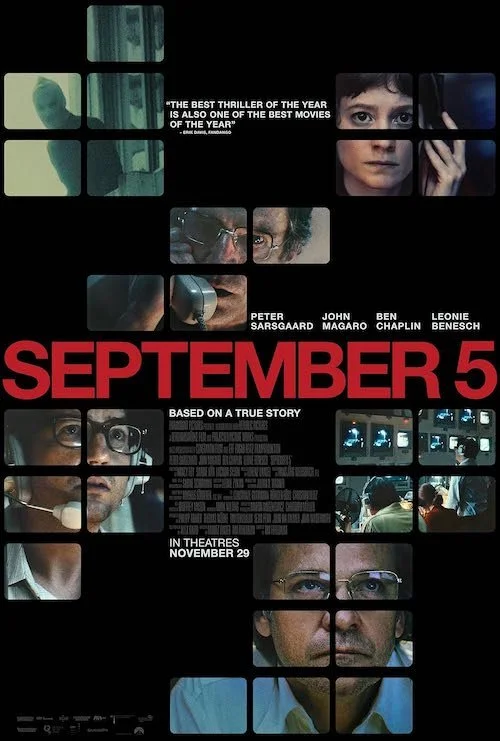September 5
Written by Andreas Babiolakis
When a certain topic has been captured well enough in a film, it feels redundant to revisit it again. Such is the case with Steven Spielberg’s approach to the 1972 Munich massacre that took place at the Olympic games (where members of the Palestinian group of militants, Black September, held Israeli athletes hostage in the Olympic village); Spielberg’s film, Munich, is one of the stronger films in the director’s body of work within the twenty first century. When Tim Fehlbaum’s September 5 was first announced, it seemed futile to return to this moment in history. Once I learned the approach taken — one where we are confined strictly to the ABC Sports newsroom and are left to the devices of a team as they learn bits of information (and decide how to relay what they’ve learned to the world) — I understood why Fehlbaum and company decided to tackle these circumstances again.
ABC executive Roone Arledge (Peter Sarsgaard) and control room supervisor Geoffrey mason (John Magaro) are at work early September 5th (yes, the film is titled September 5 and not September 5th, which will take some getting used to), preparing for Olympics-based coverage. Translator Marianne Gebhardt (Leonie Benesch) claims to hear faint gunshots in the distance, but it is once there is a tip provided that the ABC Sports team have a decision to make: how do they go about this news? Do they try to get footage of the hostage situation live (or is there a possibility that the families of the hostages may see their loved ones executed on national television)? How do they circumnavigate the police squads trying to take control of the situation with extreme force? Since we never leave the news room or its immediate surroundings, we are confined to what these protagonists see: a unique-enough angle to such a story that makes September 5 feel worthwhile at least in this respect.
September 5 is thrilling enough to make do with what it has.
In that same breath, for better or for worse, I was left forever itching to see more of what was going on. We’re left with such few resources and context that much of the film is us having to ascertain what we believe is happening, but that gets you in the mindset of what it’s like to work in such an environment and work with what you have. It adds intrigue to the film, but also has the occasional adverse effect where it holds some key moments — like the climax — a little back; even Alfred Hitchcock’s Rear Window broke through its gimmick of being stuck in one room for most of the film when it knew it needed to. Sadly, given how the film is laid out, it’s not as if there was another way Fehlbaum and company could have strengthened the film in this respect; it’s just the price to pay when you have an original approach to a story and must stick it through the entire duration, I suppose. If September 5 randomly shifted gears and was shown from the vantage point of the hostages for short periods of time, then its original concept doesn’t work. Such is the gamble with depicting real events with as much accuracy as possible; they don’t always perfectly translate to how a film should be made.
Having said that, September 5 works tremendously with what it has, giving the kind of tempo, tension, and spitfire dialogue that all great journalistic thrillers possess. While it doesn’t quite reach the heights of, say, the best Aaron Sorkin scripts or the strongest journal-based dramas of our time (like Spotlight), but it holds its own for the most part given the committed performances, the mostly-successful gamble of having the film take place over the course of twenty four hours in one setting, and September 5’s refusal to ever ease up off of the gas pedal. With a short enough runtime of ninety minutes and an eagerness to get through as much information as efficiently as possible, September 5 doesn’t hurt to take a chance with. It never gets exhaustively dramatic, nor does it feel uninterested in its subject either. It’s somewhat in the middle: an effort to be as bare-basics and truthful about this experience as it can be (as far as I know, anyway). You may not learn more about the Munich massacre if you are already well read on this moment of history. However, if you’ve ever wondered what such a situation would feel like in the stressful environment of those who deliver us these grave news, September 5 is a mostly great depiction of real-time strategy, ambiguity, chaos, and moral consciousness.
Andreas Babiolakis has a Masters degree in Film and Photography Preservation and Collections Management from Ryerson University, as well as a Bachelors degree in Cinema Studies from York University. His favourite times of year are the Criterion Collection flash sales and the annual Toronto International Film Festival.






